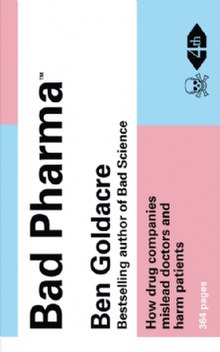Health information literacy and critical thinking to the rescue
Quackery is a fuzzy concept that can be defined in broader or narrower terms, but here I will use the concept to touch upon health fraud, bad science, pseudoscience, and misinformation. Health quackery has come in many forms over the ages (both outside and within the medical establishment), but it seems fair to say one antidote is a combination of health information literacy and critical thinking.
The April exhibit on the main floor of the Redpath Library Building is a playful attempt to capture a few of the historical and contemporary issues related to the subject, while also drawing on some resources that may be useful in developing a critical approach to the marketing of health products and services. Here I have selected a sample of authors who have written directly or indirectly on the topic.
Ben Goldacre, known in part for a column he penned in The Guardian, has written accessible books such as Bad Science and Bad Pharma, taking a critical look at alternative approaches as well as the pharmaceutical industry. He is a proponent of open science and runs the Bennett Institute for Applied Data Science.
Paul Offit is a pediatrician specializing in infectious diseases with expertise in vaccines, immunology, and virology, and his work contributed to the development of a vaccine for rotavirus. He is an interesting example of the complexity of being publicly accepted as a trusted figure when you are seen as having a conflict of interest (COI), financial or otherwise. That said, anybody trying to sell you some kind of health product or service, pharmaceutical or not, can be accused of a potential conflict as well, and many such figures do not disclose or admit their own COIs.
Jen Gunter, a gynecologist who has written for the New York Times, is not afraid to call out celebrities for their questionable health claims. She is an advocate for women’s health.
Timothy Caulfield is a Canada Research Chair in health law and policy at the University of Alberta. He takes fun pokes at celebrity “health” culture. You can also find him on Twitter.
Joe Schwarcz is one of McGill’s resident skeptics when it comes to health quackery and has written many books which may be of interest to critical minds. He is the Director of the Office for Science and Society and seeks to elevate the level of critical thinking applied to health and scientific claims.
Critical thinking and health information literacy
Antidotes to health quackery include critical thinking and health information literacy. There are many problems with medical research and valid criticisms with regard to relying too dogmatically on certain study designs as best evidence, for example, but the accumulation of science-based knowledge is an evolving process, studies can be badly or well done, and we need to learn to be comfortable with uncertainty while able to appraise–at even a basic but solid level–the available evidence.
Regulation
Health quackery flourishes in unregulated environments. Regulation is one way in which the public is protected from false or overreaching claims. Knowing more about how food, drugs, and other products are regulated helps understand why some seemingly outrageous claims still seem to make it through the protections in place.
Assessing health information
Some other potential remedies when seeking trusted health information and interpreting health research:
Users’ Guides to the Medical Literature
Many thanks to Joe Schwarcz for providing the community with his critical perspectives on the topic, as well as for loaning us some interesting examples of products marketed to consumers for their presumed health benefits (check out his Facebook video). The ducks are also thanks to his extensive collection.
A big thank you to Tamanna Patel, Mary Yearl, Lucy Kiester, and Amanda Wheatley for their invaluable help with this exhibit! Any sources of criticism are entirely the responsibility of Genevieve Gore.









